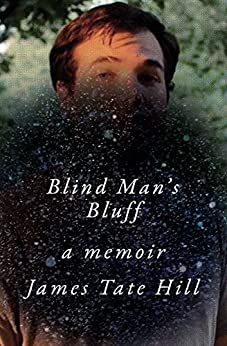
Blind Man’s Bluff: A Memoir by James Tate Hill is a humorous story of a not-so-funny condition. From his teen years, Tate’s eyes began to fail due to a rare degenerative disease, Leber’s hereditary optic neuropathy, that left him legally blind. The story begins in 1998, when Hill has just graduated from college. The narration uses flashbacks to his childhood struggle to cover up his disability.
The title of the book refers to a children’s game, but also refers to Tate’s efforts to hide his disability, and to attempt to live a normal life rather than appear needy. As a teen he manages to get by at school by accepting mediocre grades, rather than admit he couldn’t see the blackboard or read assignments.
At college, he refuses to use a cane or a guide dog. At times he puts himself in danger, trying to navigate walking along busy streets. Since he can’t read a menu, he usually orders the same food in restaurants. When shopping for groceries, he can distinguish eggs from canned goods, but he can’t read labels, so he learns to eat strange combinations of food. He marries, but because of his choice not to disclose his blindness to others, the relationship is strained and his marriage is in trouble.
Despite the gravity of Tate’s condition, Blind Man’s Bluff is laced with humorous situations, anecdotes, and hope. I enjoyed the reference to books, movies and music of the 80s and 90s. As an observer, I often wondered why Tate didn’t just tell people of his blindness. His life would have been so much easier. But it wasn’t my choice, and I enjoyed reading the author’s perspective of dealing with the challenging circumstances of a very personal debilitating condition. I highly recommend this book to anyone, but especially to those dealing with personal challenges. The book is available in print, in e-book format, and also in audio.


Great review, Mary. I could relate to Tate’s story as my late husband wore hearing aids because of a nerve deafness from birth. In the 40 years we were married, we had many, many humorous moments because of what he “thought” he heard. A different perspective, for sure. Wearing two hearing aids later in his life brought added wonderments he had missed all of his life. He always told me about how he felt a great loss because people didn’t realize he couldn’t hear them when their back was turned to him. People like my husband and Tate probably didn’t want to be an “extra burden” if people knew of their abnormal situations. If only “all of us” realize this.
That’s really interesting, Alice. It’s sad that your husband (whom I remember fondly) missed out on conversations that he might have enjoyed. They say hearing loss is actually more difficult than sight, that people with hearing disorders feel “left out.” Thank you for your comment.